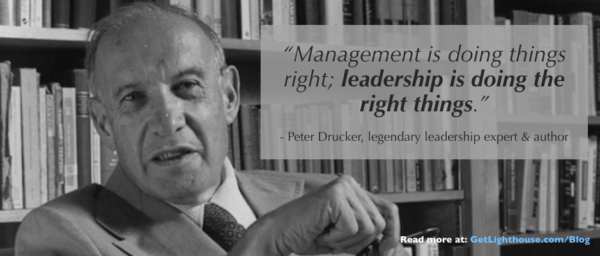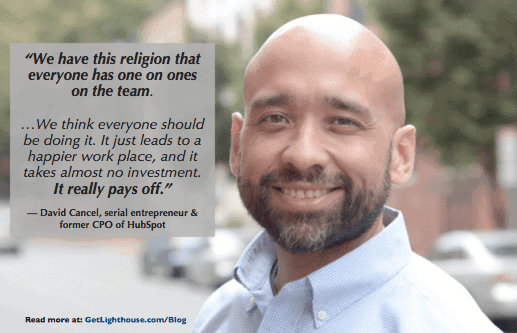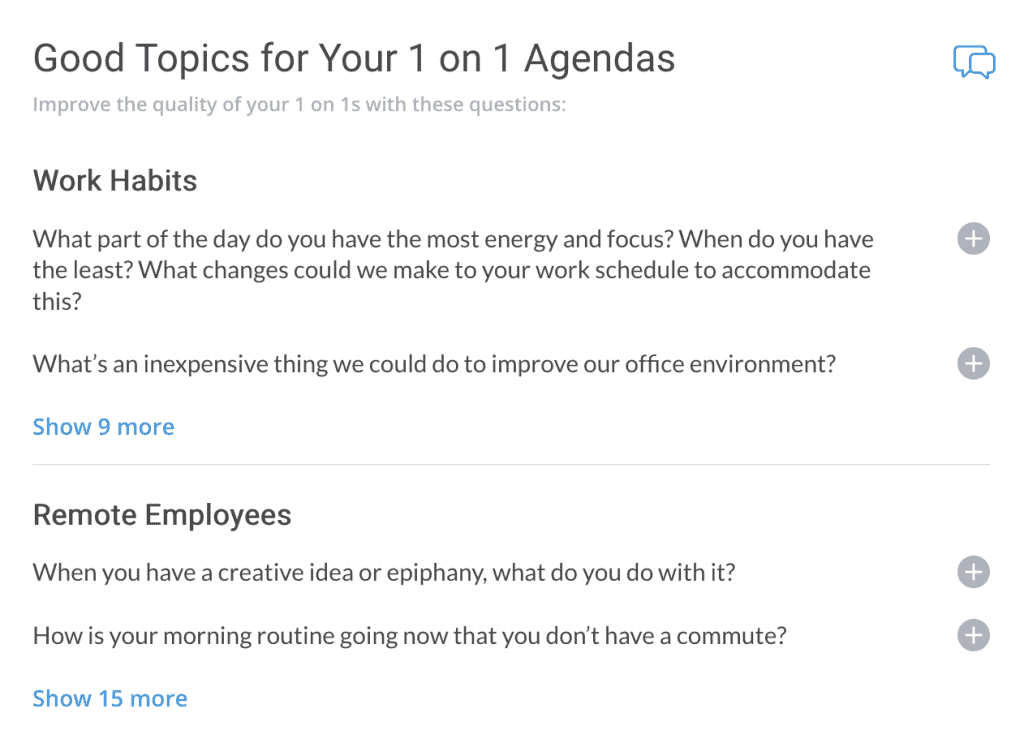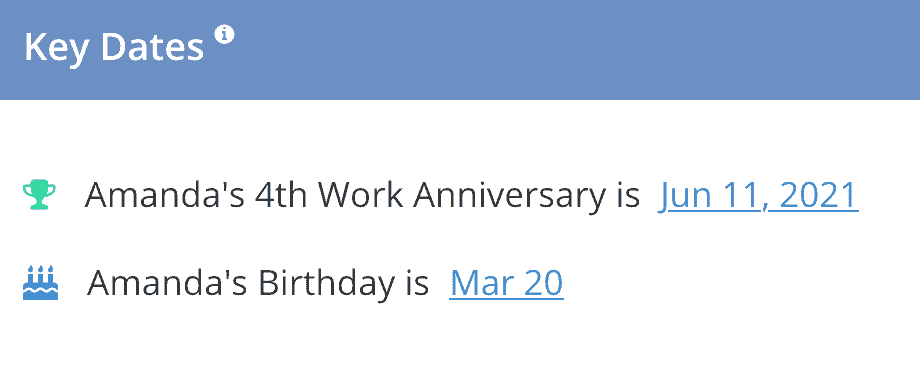Do you and your team members come to 1:1 meetings prepared? Do you have difficulties finding meaningful topics to discuss to make your check-ins worthwhile?
Ongoing 1:1s are the perfect opportunity to uncover valuable insights about your team. They are the best time for you to provide coaching, as well as give & receive feedback to help everyone work better together. They are also crucial for catching issues and building a team with low turnover.
In these meetings, both participants have a chance to express their views and concerns openly. That's not always possible in larger groups.
1 on 1s are also a great way to turn words into action and bring about consistent, ongoing change & improvement. The more explicit and intentional you are in your 1:1, the more likely it is you'll experience all of these benefits.

Easier said than done
Despite knowing all the *potential* value of 1 on 1s, having a clear plan and structure in mind for every meeting can be a challenge. For Mike Pretlove, former operations manager at Campaigntrack, getting more out of 1:1s with his direct reports was becoming difficult.
This was happening due to the following reasons:
- Too Much: Tracking every meeting and team member in separate text files was cumbersome and unwieldy
- Lack of Focus: Not knowing what the goal of a particular meeting was, and not preparing for it led to wasted time
- Little Engagement: Keeping direct reports motivated and engaged during check-ins wasn't magically happening on its own
- Remote Disconnect: Maintaining connections with people remotely required more focused efforts than was happening naturally
Mike used Lighthouse to give his 1:1s a boost
For ten years, Mike had been organizing the management of his team members ad hoc.
Then he found a centralized tool to help him track 1:1 meetings from one, central place - Lighthouse.
He found our software by looking for something that integrates with his Google Calendar (Lighthouse also works with Outlook, Slack, Teams, Trello, and many of your other favorite tools!). He soon realized his team could use many other features of Lighthouse, too.
Today, we'll share with you the impact Mike felt with his team at Campaigntrack (note: he recently left to start his own company, which we're excited to help him with as his team grows there). We'll also show you how to use Lighthouse to get similar results to Mike.

How Mike Pretlove used Lighthouse's versatility to drive engagement, become a better coach for his team, and achieve low turnover
In this post, we'll focus on the specific areas where Mike's team improved by using Lighthouse. Before we do that, there are a few general benefitss that Mike and his team experienced.
According to Mike:
"Keeping all the data in a single place is naturally very helpful. Centralizing an individual's catch-ups, goals and general information is a lot better than my ad hoc methods in the past.
Why have a dozen docs spread all over, when you can in one click switch between anyone on your team and anything about them?
Lighthouse immediately had a big impact on Mike and his team at Campaigntrack due to better organization and focus. However, there were some benefits that became obvious only after a while as well. Having consistently great 1:1s was one of them:
"The immediate benefits were us being more organized and efficient. There was much less time wasted.
As we continued using Lighthouse, we started having higher quality one on ones. Subordinates became familiar with my process. Soon they started adding things to talk about on their own, too.”
Being a good manager can be hard to quantify. However, using Lighthouse turned out to have a very important, measurable impact at Campaigntrack. It contributed to keeping employees happy and preventing turnover:
"Departments reporting to me self reported the highest satisfaction levels in their quarterly check ins. My departments also achieved the lowest staff churn rates in the business.
Given the service-based nature of the work, recruitment costs are a variable that can blow out if staff retention is poor. All my departments have been under operating budget for the duration I have used Lighthouse.”
There are many other areas where Lighthouse was able to help Mike and his team thrive. We've highlighted the four most important ones below:
- Setting goals and building rapport
- Driving engagement
- Managing remote teams better
- Becoming a better coach
1. Setting goals and building rapport
If you want to retain your team over the long term, there are two things to be aware of. The first one is helping your team continuously grow.
A 2017 SHRM report revealed that only 29% of employees are "very satisfied" with their career advancement opportunities.
The same report found that 41% of participants think this is a very important factor for job satisfaction.
Similarly, Gallup's data shows that if you don't build rapport and connection with your team, there's almost a zero chance anyone on your team is engaged:
How the Rapport and Goals features of Lighthouse helped Mike be a better manager
The Rapport and Goals features of Lighthouse proved important for Mike's team at Campaigntrack. As he explains:
"I love both the Rapport and Goals sections.
For rapport, the benefits were that it would remind me about specific life events for employees. This also applies to difficult to remember personal concerns. Some examples include pets and general family updates.
As for goals - all my direct reports are working towards quarterly targets. Lighthouse's Goals feature provided us with a collaborative space for goals to be set together and progress to be monitored.
It is really beneficial for my staff to use as a reference but also mark each incremental step as complete throughout the quarter.
This was very useful in our formal quarterly check ins. Reporting total progress was as simple as viewing their page in Lighthouse.”
If you're interested in how to build rapport with your team, you can read the following blog posts:
- How to Build Rapport with Anyone
- 82 Ways How to Build Rapport With Anyone You Work With
- Why You Should Build Rapport with Everyone You Manage
And here are a couple of our resources on helping your team set goals and following through on them:
- How to Help Your Team Achieve Their Goals
- The 3 Questions Every Manager Struggles with Making Career Development Plans
2. Driving engagement
In 2018, Gallup found that 52% of all employees in the U.S. consider themselves "disengaged” at work. Disengaged employees feel psychologically unattached to their company. They put in time, but not energy or passion, into their work.
Employees who are not engaged generally put in the least effort. They won't go out of their way to contribute to your team. They're also much more ready to jump ship and go find another job. Or, even worse, they stick around, doing the bare minimum or less, possibly even becoming a disruption on your team.
When you instead engage employees, you see all of these benefits:
It isn't always easy to pinpoint all the causes of employee disengagement and low morale, but here are some of the most common ones:
- Poor communication
- Lack of feedback
- Career growth and development stalling
- Unclear purpose of work
- Lack of trust and confidence in their manager
- Bottled up frustrations
- Interpersonal and inter-team conflicts
Fortunately, Lighthouse can help with many of those.
How Mike Pretlove used Lighthouse to drive engagement among his direct reports
Mike's approach to driving more engagement started with higher quality 1:1s. As he put it:
"As a tool to manage 1:1s, Lighthouse helped provide all staff with a clear and specific time to raise issues. They were able to give feedback and suggestions where they might otherwise not find an appropriate time to discuss them.
Here's one specific example I remember: A staff member cited their 1:1s with Lighthouse as the opportunity to always get an answer. This happened because they wouldn't forget to ask, and I wouldn't forget to respond.”
By arming Mike with great Suggested Questions to ask his team, and nudging his team to contribute to the agenda for their 1 on 1s, it created a place for a clear, consistent, open dialogue every time they met.
Helping your direct reports understand the value of 1 on 1s
Before using Lighthouse, it wasn't always easy for Mike to get the most out of his check-ins with direct reports. The managers who reported to him had hectic schedules. A lack of structure in 1:1s contributed to them feeling less engaged.
Fortunately, Lighthouse was able to help them understand the importance of consistent check-ins, and gave them a reason to look forward to, instead of dread, their meetings with Mike:
"All managers consider themselves to be busy. Ineffective one on ones with your manager are not prioritized by you and your fellow team members as a result.
By implementing Lighthouse, the quality of manager 1:1s improved as the managers reporting to me saw the value in spending their 1:1 time with me on a regular basis as well.”
Your 1:1 meetings are the perfect time to have ongoing, meaningful conversations with your people. Regardless of whether they're individual contributors, part of a group, or direct reports, you need a way to engage them consistently.
Lighthouse lets you set action items to make progress every time and keeps everyone motivated. It does so by reminding them (and you) of commitments for each check-in. If both you and your people have short- and long-term goals to work toward, there's a much lower chance of disengagement becoming a problem.
3. Managing remote teams better
Supporting remote employees is much different than working with them in an office. Many of us were caught off guard when COVID lockdowns forced everyone to suddenly become a remote leader.
According to Buffer's State of Remote Work report from 2021, remote employees face many unique challenges:
The challenges of working remotely were complicated enough in the past. Unfortunately, COVID-19 has multiplied them and made them worse.
People are feeling more vulnerable than ever. That's why knowing how to lead remote teams has become one of the most important skills for any manager.
Mike used Lighthouse to maintain close connections to his remote employees
Even before the coronavirus hit, Mike used Lighthouse to stay connected to his remote teams:
"Our work is split over three countries so my direct reports are often not located in the same office as I am. Lighthouse helped as a collaboration tool between myself and my staff.
It also played a role in keeping a personal connection alive. Having reminders about important aspects to my direct report's lives was great.
Last year, all teams were forced into remote work as a result of the global pandemic. Lighthouse provided a platform to connect in a recorded manner that proved easy to track.
I was able to maintain close communications and oversight about the less tangible aspects of employee well-being. This level of connection complemented the other efforts the business was making. It helped improve employee engagement in very difficult conditions.
For staff who habitually interacted with me in person on a daily basis, when they were suddenly forced to work remotely, the Lighthouse platform gave them the direct method of communication when their preferred method was shut down by external forces.”
Lighthouse prepares managers for the unique circumstances of leading remote teams. We do this by offering you questions specific to that scenario to help you have more meaningful 1:1s.

Your 1:1 meetings are especially important when managing remotely, because you don't have all that in office face time you normally would.
We also enable you to remember key information about your team. You'll be able to build rapport with them even when they're continents away.

Remember their birthdays, their work anniversaries, the names of their spouse and children, and any key hobbies and interests. You may be surprised how meaningful it is to spend even 5 minutes asking about those things.
For more advice on how to be a great remote leader, check out the following posts:
- How to effectively manage remote employees
- 31 Questions to Ask Remote Employees to Better Support Them
- 5 Things You Didn't Expect When Managing Remote Teams in COVID (and what to do about it)
4. Becoming a better coach
An important part of using Lighthouse revolves around effective coaching methods. Being a good coach is an essential skill for managers today for a variety of reasons:
- Managers who are also coaches motivate their team by regularly engaging them, uncovering their unique talents, and setting clear expectations.
- Coaching is essential for bringing out the best in your team. This is especially true in times of crisis. Think periods of layoffs, hiring freezes, or budget cuts, etc.
- Coaching helps your team avoid costly mistakes that can negatively impact revenue.
- Coaching is also great for creating better relationships and preventing turnover.
Lighthouse is purpose-built to make you a better leader & coach. It encourages employees to continuously give feedback about what they need to progress and sets you up to help guide them in the short and long term.
According to Gartner, people who report to good coaches can be up to 40% more focused on their work. Especially at a time with so many distractions and challenges in the world, you owe it to your team to do the best you can for them.
A Surprise Bonus: Mike's MBA program corresponded to Lighthouse's principles about coaching
On top of being a senior leader at Campaigntrack, Mike Pretlove also devoted some of his time to getting an MBA. Many of the leadership principles from his studies matched the ideas behind Lighthouse, as he told us:
"Part of my MBA studies focused on effective coaching methodologies. Lighthouse's discussion prompts (suggested questions) are based on the same principles as those methodologies.
They empower employees to explore how they themselves might overcome obstacles. They also encourage them to be more proactive about their career development and growth. This way of thinking has made it easier for them to ask for my coaching at the right time.”
As a coach, you need to discover what each person on your team needs to become better at their job, and get ready for their next role/promotion. That's why Lighthouse teaches you tested principles to encourage everyone to open up and have the important conversations.
Mike was able to combine these principles and his education to provide his team the coaching they needed.
To learn more about how to be a better coach, check out these links:
- Why Today's Managers must Become Coaches (and how you can do it)
- Employee Coaching: Why it Matters and How to Become Great at It
- 12 Questions to Ask Your Team to Become a Better Coach at Work
Conclusion: Be like Mike to be a better manager with Lighthouse
For Mike Pretlove, using Lighthouse improved him and his team in several important ways.
- They helped him become more deliberate and prepared for 1:1s. They also enabled him to track meetings from one centralized location.
- Suggested questions ensured he had productive conversations, and expanded the topics they covered in their 1 on 1s.
- His team was more prepared for check-ins thanks to our automated reminders, and learning from Mike's improved example he set for the meetings.
- Being able to review action items in a consistent way kept everyone accountable and making progress. This was especially important for the managers who reported to Mike. They had extremely busy schedules and benefited from more structure.
- The rapport section enabled Mike to remember key details about his people, which helped show his team he cared about them as people, not just workers completing tasks for him.
- Lighthouse also allowed him to keep an eye on everyone's short- and long-term goals to ensure everyone made progress. Measuring that progress was as easy as checking who delivered on their promises. Tracking everything became much easier with a tool that stores information in one place.

Lighthouse made a difference for Mike on several levels.
Mike also found that certain leadership concepts taught in his MBA align with Lighthouse's recommendations. He was able to combine his education and our software to become an even better coach for his employees.
Additionally, Mike's team dealt with being spread across three countries. They used Lighthouse's features to stay close to each other.
This resulted in more valuable 1:1s, better communication, and lower staff churn rates.
Campaigntrack operates in the Real Estate space - a service-based industry. This means keeping recruitment costs low was one of the company's biggest priorities. Lighthouse played a key role in keeping Mike's team happy and engaged.





